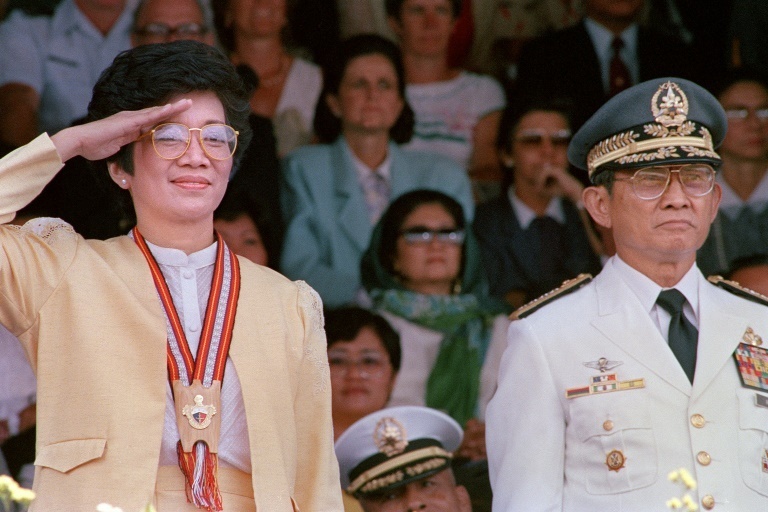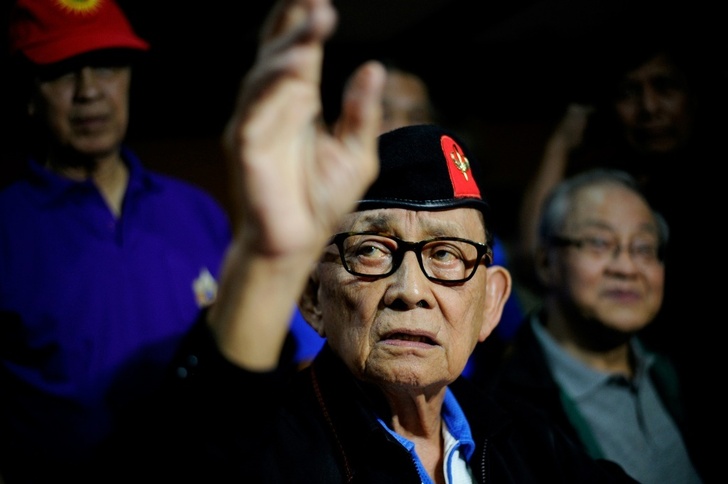Former Philippine president Fidel Ramos, who oversaw a rare period of steady growth and peace that won him the reputation as one of the country's most effective leaders ever, has died aged 94, his family said Sunday.
Known as "Steady Eddie" for his unflappable demeanour during the country's regular moments of upheaval, he was frequently pictured chewing unlit cigars as he guided the Philippines with a sure hand from 1992-1998.
A career military man who never previously held elected office, his professorial conduct was unlike the bombastic image of many Filipino politicians.
He was also the first Protestant to win the top office in the overwhelmingly Catholic nation, despite opposition from some in the Church. He later made an aggressive push for family planning to rein in rapid population growth.
But like other top officials of his generation, Ramos played a role in the dictatorship of Ferdinand Marcos, which saw thousands killed and thousands more arbitrarily imprisoned.
In a brief statement, the Ramos family said it was "profoundly saddened" to announce the patriarch's death. The cause was not released.
Lawmakers, diplomats, ex-politicians and the new administration posted tributes to Ramos on social media.
"I extend my deepest condolences to the family of former President Fidel Valdez Ramos who passed away today having lived a full life as a military officer and public servant," said President Ferdinand Marcos Jr, the son and namesake of the late dictator, who took office last month.
"The legacy of his presidency will always be cherished and will be forever enshrined in the hearts of our grateful nation."
The European Union delegation in the Philippines expressed its condolences, describing Ramos as a "dedicated statesman" and "pillar of democracy".
A graduate of the prestigious West Point military academy in the United States, Ramos had a lengthy career in the armed forces, including combat against communist guerrillas, and was deployed in the Korean War as part of the Philippine contingent.
He was later commander of the paramilitary Philippine Constabulary -- the key institution that enforced the brutal repression of dissent after Marcos declared martial law in 1972.
Ramos's moment of truth came in February 1986, when popular outrage was hitting its peak over the murder of opposition leader Benigno Aquino and massive regime cheating in a snap election.

Facing arrest, Enrile and his allies holed up in the military headquarters in Manila and appealed to the public to protect them from an imminent government attack.
Ramos joined their rebellion, withdrawing his support from Marcos and inspiring many others to rise up as well.
Soon, millions were massing in the streets for the peaceful "People Power" revolt that sent the dictator into exile and ushered in Corazon Aquino as president.
- 'My atonement was revolt' -
Aquino promptly appointed Ramos as military chief and then defence secretary in gratitude.
When elections came in 1992, Aquino gave her endorsement to Ramos, which was crucial to him winning the presidency despite the opposition of influential Catholic Church figures.
As president, Ramos solved a crippling power crisis caused by years of under-investment in energy, and broke up cartels in telecommunications, aviation and shipping -- boosting a moribund economy that reaped a period of renewed growth.
He also made peace overtures to communist guerrillas, Muslim separatists and military coup-plotters.
In the end, only the communists refused to sign agreements with his government.
Ramos was also a key, early supporter of Rodrigo Duterte as he waded into national politics with his run at the presidency in 2016. Post-election, Ramos served as the special envoy to Beijing to ease tensions over the disputed South China Sea.
But the relationship swiftly soured -- he has publicly criticised Duterte's expletive-laden speeches, his moves away from the US alliance and his anti-drug campaign that claimed thousands of lives.
Ramos was also aghast at Duterte's decision to allow Marcos to be buried in the national Heroes' Cemetery despite the damage his dictatorship caused to the Philippines' economy and social order.
When a Marcos daughter tried to link Ramos to the abuses of her father's rule, Ramos said he had already apologised and made amends for his role.
"My atonement was leading the military and the police" in the revolt that toppled Marcos, he said.
bur-cgm/amj/lb
© Agence France-Presse
Your content is great. However, if any of the content contained herein violates any rights of yours, including those of copyright, please contact us immediately by e-mail at media[@]kissrpr.com.
Source: Story.KISSPR.com

